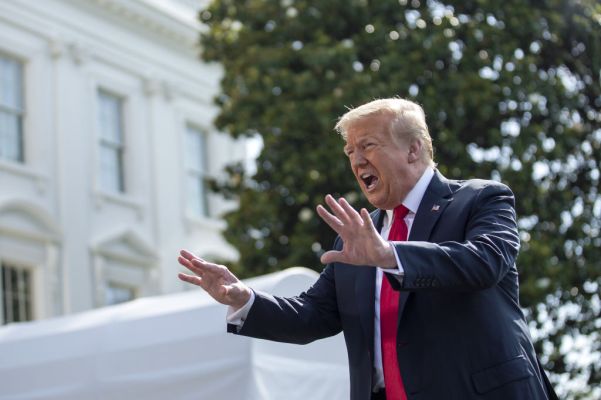

President Donald Trump said he could act to ban the world’s most popular short video app TikTok from the U.S. as early as Saturday, according to The Hill.
The president said he could use “emergency economic powers or an executive order” to bar TikTok from the U.S., he told reporters aboard Air Force One on Friday.
The news came hours after reports broke that Microsoft was in talks to buy TikTok. Investors are reportedly valuing three-year-old TikTok at $50 billion. In his remark on Friday, Trump signaled he was not supportive of allowing an American company to acquire TikTok.
On the same day, Bloomberg reported that Trump could order ByteDance to divest its ownership of TikTok.
In response to Trump’s decision, TikTok, as usual, tried to make a case that it’s in the interest of the U.S. to keep the app and it poses no national security threat:
“100 million Americans come to TikTok for entertainment and connection, especially during the pandemic. We’ve hired nearly 1,000 people to our U.S. team this year alone, and are proud to be hiring another 10,000 employees into great paying jobs across the U.S. Our $1 billion creator fund supports U.S. creators who are building livelihoods from our platform. TikTok U.S. user data is stored in the U.S., with strict controls on employee access. TikTok’s biggest investors come from the U.S. We are committed to protecting our users’ privacy and safety as we continue working to bring joy to families and meaningful careers to those who create on our platform,” said a TikTok spokesperson.
Trump’s announcement confirmed weeks of speculation that U.S. regulators planned to block TikTok, which is immensely popular among American teens, over concerns that it could be a spying tool for Beijing.
The question is how a divestment or ban of TikTok will take shape. TikTok is owned by Beijing-based ByteDance, which has emerged as the most promising tech startup in China in recent times, reportedly valued at a staggering $100 billion. It operates Douyin, the popular Chinese version of TikTok, separately for China-based users.
ByteDance has sought various ways to distance TikTok from any Chinese association. Efforts in the past few months range from appointing former Disney executive Kevin Mayer as TikTok’s CEO, claiming the app’s data is stored on American land, through to promising to create 10,000 jobs in the U.S.
TikTok’s comms team also tried to assuage concerns by reiterating that four of its parent company’s five board seats are “controlled by some of the world’s best-respected global investors,” including Arthur Dantchik, managing director of Susquehanna International Group; William Ford, CEO of General Atlantic; Philippe Laffont, founder of Coatue Management; and Neil Shen, the boss of Sequoia China. ByteDance founder and CEO Zhang Yiming is the chairman of the board.
It’s worth noting that the Committee on Foreign Investment in the U.S. (CFIUS) still hasn’t released its decision on whether the Musical.ly-TikTok merger constitutes a national security threat to the U.S. Even if it orders TikTok to shed Musical.ly, it’s unclear how the sale will happen in practice. When ByteDance merged the two apps back in 2018, it asked Musical.ly’s existing users to download the TikTok app, which already had users.
If the divestment is aimed at TikTok, will ByteDance be forced to sell all of its international assets? TikTok also has a substantial user base outside the U.S. Before India banned TikTok over national security fears, a favorite criticism among many U.S. politicians, the country was the app’s largest overseas market.
It’s looking increasingly likely that Zhang Yiming’s worst nightmare is going to happen. The entrepreneur had aspirations to conquer the international market from the outset, and now his startup has become the latest pawn in U.S.-China relations.

Recent Comments